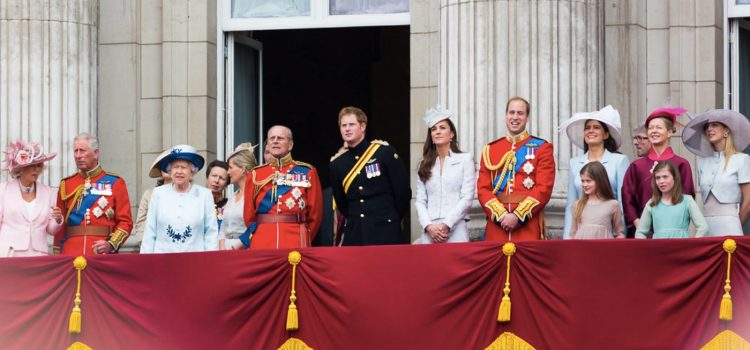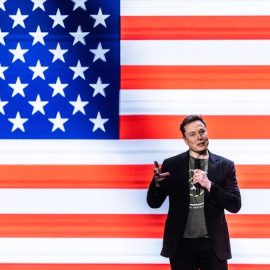

This article is an excerpt from the Shortform book guide to "Spare" by Prince Harry. Shortform has the world's best summaries and analyses of books you should be reading.
Like this article? Sign up for a free trial here.
Who is a part of Prince Harry’s family tree? What family members does he have the most tension with?
In Spare, Prince Harry details why he and his wife, Meghan Markle, decided to leave the Royal Family and move to America. This, in part, is because of his often difficult relationships with his closest family members.
Below we’ll look at the relationships that caused Harry and Meghan to leave.
The Late Queen Elizabeth II
Harry was born on September 15, 1984, the son of current King Charles III and Diana Spencer—better known as Diana, Princess of Wales. He’s therefore the grandson of arguably the most important figure in Prince Harry’s family tree, the late Queen Elizabeth II, who was the United Kingdom’s longest-reigning monarch and a beloved figure in British society.
(Shortform note: Queen Elizabeth was the longest-reigning member of a long dynasty of monarchs. The British Royal Family has reigned for well over a millennium, and it traces its lineage directly to King Alfred the Great, a legendary medieval king. The current royals adopted the name the House of Windsor during World War I, due to fears that their former name (House of Saxe-Coburg-Gotha) sounded too German.)
Harry had a special relationship with the late Queen. He portrays her as warm and loving, with a great sense of humor, and says that pictures of the two of them always seemed to show them silently sharing secret and private jokes.
(Shortform note: Harry writes as though presenting a side of Queen Elizabeth that most people never saw. However, the late Queen’s sense of humor and her close, humor-filled relationship with Harry were well known and documented.)
Despite how close he was with Queen Elizabeth, Harry says that shows of affection between members of the Royal Family were practically unheard of, even in private. He mentions feeling intense jealousy whenever he heard about, for example, the Queen hugging a sick child during a hospital visit.
(Shortform note: Throughout history, the Royal Family’s relationships with each other have often been strained or distant. For example, Queen Victoria once wrote to a friend that she only checked in on her children once every few months. In other words, what Harry describes here isn’t a new problem—though that doesn’t devalue the fact that he sees it as a problem.)
In the book’s epilogue, Harry briefly discusses going to Queen Elizabeth’s funeral in September 2022. He describes his fondness for his grandmother and says that he felt a deep sense of connection with the people who offered him condolences—and, through them, with the United Kingdom as a whole.
(Shortform note: Spare focuses on Harry’s personal emotions surrounding the Queen’s passing, but he’s right that much of the UK shared his grief (along with much of the rest of the world). Elizabeth II had reigned since 1952—longer than most of her subjects had been alive—and was widely beloved and admired. One grief specialist said that people around the world experienced the Queen’s passing like the death of a family matriarch—a powerful female figure who had always been present, and whom it was hard to imagine a world without.)
Diana, Princess of Wales
The family member that Harry talks about most is the one who was in his life for the least amount of time: his mother, Princess Diana. Harry’s parents separated in 1992, and officially divorced in 1996. Princess Diana died in a car crash one year later, in 1997, when Harry was only 12.
Harry remembers his mother very fondly, and he speaks frequently about the pain of her absence. His intense love for Princess Diana, and the trauma he experienced as a result of her death, are recurring themes throughout the book.
Harry explains that he had problems with his memory after losing his mother—many of the anecdotes from his childhood are things that he heard about himself secondhand. He also had trouble processing and expressing his emotions, saying that until around 2014, the last time he cried about his mother’s passing was at her burial.
Harry blames the press for his mother’s death—he says she got into that fatal car crash while trying to flee from reporters and photographers. We’ll discuss Harry’s issues with the press further later in this guide.
(Shortform note: The official story of Diana’s passing is that her driver was drunk and accidentally crashed the car while being chased by the press, and numerous investigations into that night’s events confirm the story. However, there are countless conspiracy theories arguing that her death was actually murder—although who supposedly orchestrated the crash, and why, change from theory to theory. It’s worth noting that Harry isn’t pushing one of those theories; he doesn’t accuse the press of killing his mother on purpose. Rather, he says the reporters chasing her created a dangerous situation that led to the fatal accident.)
King Charles III
Harry portrays his father Charles as kind, but distant; often unable to express his emotions, or to provide Harry with the love and support he sometimes needed. For instance, Charles’s only advice regarding Harry’s unfair treatment in the media was to ignore it; he didn’t offer any real sympathy or help.
Harry also has reason to believe that someone on his father’s staff was feeding harmful stories about him (Harry) to the press, and Charles refused to intervene. Harry explains that deflecting media attention to other royals to protect one’s own reputation is a common practice among the Royal Family.
(Shortform note: The complicity between the Palace and the press is a major theme of Harry & Meghan, a Netflix docuseries about their lives. In fact, the series makes it clear that while it was the press who did most of the damage to Harry and Meghan—both their reputations and their mental states—the Royal Family’s refusal to stand up for them was what sparked their eventual decision to move to America.)
Queen Consort Camilla
Furthermore, during Harry’s childhood, Charles was involved in an extramarital affair with a woman named Camilla Parker Bowles (who is now Charles’s wife, and therefore Queen Consort of the United Kingdom). Harry says that his father’s relationship with Camilla eventually drove his parents’ relationship apart.
Harry has mixed feelings about Camilla. He resents her for her role in breaking up Charles and Diana and says that she unwittingly played a role in Diana’s death by splitting them apart. Harry also has reason to believe that Camilla leaked private details about his life to the press and spread rumors about him in order to boost her own reputation.
(Shortform note: Charles’s former communications secretary, Kristina Kyriacou, has said Harry’s belief that Royal Family members leak stories about each other is not just untrue, but absurd. Regarding his specific accusations against the Queen Consort, Kyriacou says that she’s never heard of Camilla doing any such thing, and she can’t imagine her intentionally harming her own stepchildren’s reputations.)
However, he also admits that Camilla brings Charles a great deal of joy. While Harry and his brother William initially asked Charles not to marry Camilla, at their wedding, he’s surprised to realize that he wants both of them to be happy. He adds that Camilla might be less likely to dig into Harry’s life for more tidbits to feed the press if she’s content.
Prince William
Aside from Princess Diana, the family member Harry discusses most is his older brother William. The brothers’ relationship was contentious; Harry portrays William as petty and self-centered, often unable to celebrate Harry’s successes because he’s too wrapped up in sibling rivalry. For example, when Harry mentioned that he wanted to do conservation work in Africa, William became upset because Africa was supposed to be “his” project.
Perhaps the most extreme example of the strife between the brothers came in 2019, when William confronted Harry about his wife, Meghan Markle. William said that she was rude, unpleasant, and impossible to please, and Harry retorted that he was just repeating lies the tabloids printed. Their argument escalated until Wiliam grabbed Harry’s collar and threw him to the ground, then demanded he get up and fight back. Harry refused and instead waited for William to leave before calling his therapist to discuss the incident.
Later, when Harry attended his grandfather Prince Philip’s funeral in April 2021, William said that all he really wanted was for Harry and Meghan to be happy. However, Harry didn’t believe him. (Shortform note: Reports—citing unnamed “sources close to William”—say that the Prince is extremely angry about Spare and his portrayal in it. In particular, these reports claim that William is livid about Harry sharing details of their private conversations, like the one recounted here; ironically, something that Harry criticizes the rest of the Royal Family for allegedly doing.)
Finally, as with their father Charles, Harry suspects that someone on William’s staff was leaking information about him to the tabloids. Also like Charles, William was either unable or unwilling to intervene.

———End of Preview———
Like what you just read? Read the rest of the world's best book summary and analysis of Prince Harry's "Spare" at Shortform.
Here's what you'll find in our full Spare summary:
- Prince Harry's autobiography about growing up as a member of the Royal Family
- The struggles that come from being the younger son—not the heir-apparent
- How Prince Harry deals with harassment from paparazzi and mental illness






